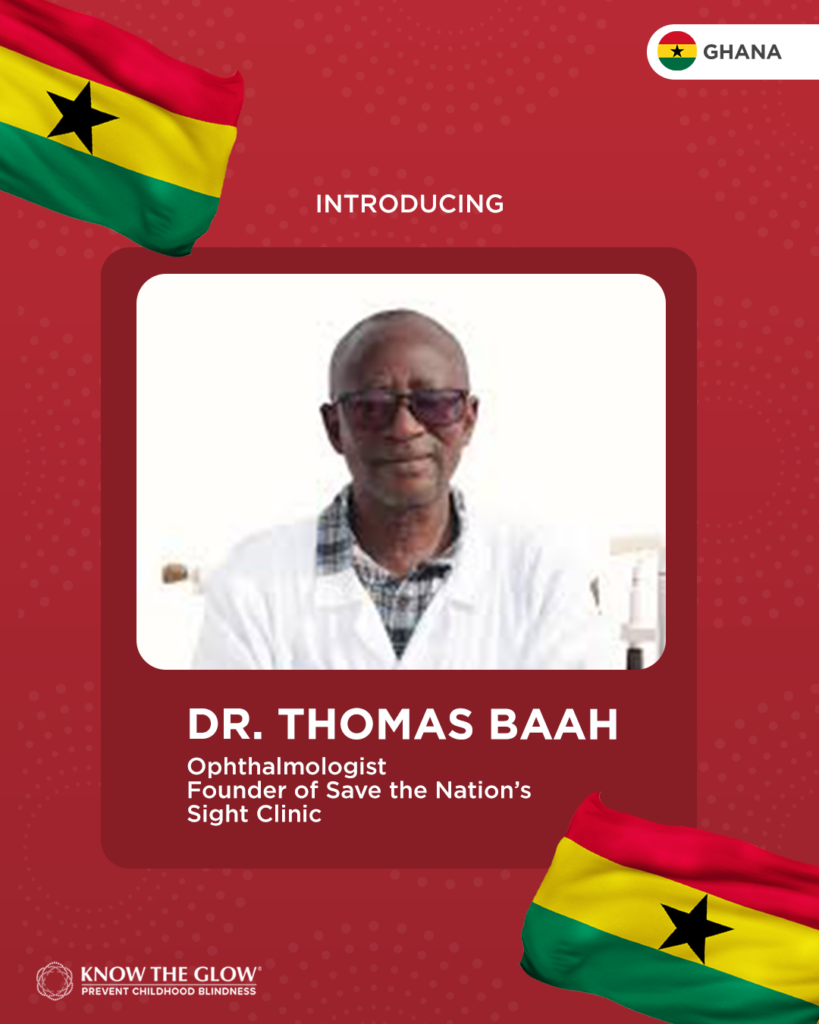KnowTheGlow recently had the privilege of speaking with Dr. Thomas Baah, an ophthalmologist and the founder of Save the Nation’s Sight Clinic in Accra, Ghana. A deeply inspiring figure, Dr. Baah has dedicated his career to expanding access to quality eye care in underserved regions of Ghana, building a sustainable model of outreach and surgery for communities most in need.
Dr. Baah’s path to medicine began in the small village of Tumu in Ghana’s Upper West Region, where he grew up in a household that knew both hardship and resilience. He recalls walking to school barefoot and attending classes held under trees due to the lack of infrastructure. A defining moment came with the tragic loss of his younger sister to measles and bronchial pneumonia, an event he attributes to the unavailability of basic medical care. The experience left a deep impression on him. At that moment, a little village boy who went to school barefoot vowed to one day become a doctor so that others in his community would not need to suffer the same fate.
His exposure to vision loss came early as well. Growing up with an uncle who was blind, Dr. Baah was intimately familiar with the challenges of living without sight. These early experiences would eventually guide him toward ophthalmology as a specialty.
As his education continued that dream stayed with him. After completing his Advanced Level exams, Dr. Baah returned to his home village, where communication was slow and newspapers often arrived weeks late. By the time he learned that his name had appeared on a list of students invited for a medical school interview, the interview date had already passed. Still determined, he traveled to the university in Kumasi to see if there was any chance he might still be considered. Once there, he had a chance encounter with a British professor, who happened to be the Dean of the medical school! The Dean listened to Thomas’ story, asked him a few questions, and then did something remarkable: he took the official admissions list that was posted on the bulletin, added Dr. Baah’s name on it with a pen, and signed it. With that simple yet extraordinary gesture, Dr. Baah’s path to medicine was set in motion, fulfilling a lifelong dream born out of loss, purpose, and unwavering persistence.
After completing medical school in Kumasi, Dr. Baah worked for 17 years at a mission hospital. Driven by a desire for independence and a deeper impact, he later established Save the Nation’s Sight Clinic in 2010. Originally founded as a mobile surgical service, the clinic focused on traveling to rural areas to conduct cataract surgeries and offer eye care to patients with little or no access to health services.
Today, the clinic operates out of Accra and remains a crucial eye care provider for both urban and rural populations. Dr. Baah leads a dedicated team of three full-time optometrists and two interns, with additional support from two to three ophthalmologists who visit weekly to conduct surgeries. The clinic also collaborates closely with SEE International, whose visiting ophthalmologists contribute surgical expertise and help transport patients from distant communities.
The clinic offers free accommodation to patients traveling from afar, helping to eliminate yet another barrier to access. Dr. Baah’s partnership with SEE International has extended beyond clinical care. He plays a pivotal role in training visiting ophthalmologists in Manual Small Incision Cataract Surgery (MSICS), a technique critical to high-volume, low-cost care in low-resource settings. In recognition of his incredible contributions, SEE International honored Dr. Baah with the 2021 Humanitarian of the Year Award.
Despite these accomplishments, the clinic faces ongoing challenges. Government subsidies for cataract surgery have dropped from $100 to just $25 per patient, making outreach programs financially unsustainable without additional support. In response, local outreach workers often identify and refer patients to the clinic, though these workers must be compensated for their time and travel, adding to the clinic’s operational burden.
Though the clinic does not currently offer general anesthesia and refers complex pediatric cases such as retinoblastoma to tertiary hospitals, Dr. Baah and his team are committed to increasing early detection and awareness. Most families, he notes, are eager to seek care when they notice symptoms appear. To that end, KnowTheGlow is excited to collaborate with Dr. Baah’s team, offering translated materials and outreach tools to help educate communities about leukocoria and other signs of pediatric eye disease.
As Dr. Baah looks toward the future, he envisions expanding both his clinic’s services and its outreach capacity. He believes firmly in the power of community education and is eager to deepen partnerships that can support Ghana’s growing eye care needs. His path highlights how adversity can inspire meaningful, long-term contributions to public health.

